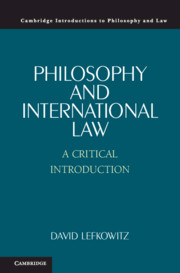Book contents
- Philosophy and International Law
- Cambridge Introductions to Philosophy and Law
- Philosophy and International Law
- Copyright page
- Dedication
- Contents
- 1 Introduction
- 2 John Austin: Enforcement and International Law
- 3 H.L.A. Hart: Social Rules, Officials, and International Law
- 4 Ronald Dworkin: Interpretivism and International Law
- 5 An International Rule of Law?
- 6 The Legitimacy of International Law
- 7 International Human Rights Law: Concepts and Grounds of Human Rights
- 8 The Law of War and Its Relationship to the Morality of War
- 9 International Criminal Law: Crimes Against Humanity and Universal Jurisdiction
- 10 International Law and Secession
- 11 International Trade Law: Free Trade, Fair Trade, and Trade in Stolen Goods
- Bibliography
- Index
4 - Ronald Dworkin: Interpretivism and International Law
Published online by Cambridge University Press: 10 October 2020
- Philosophy and International Law
- Cambridge Introductions to Philosophy and Law
- Philosophy and International Law
- Copyright page
- Dedication
- Contents
- 1 Introduction
- 2 John Austin: Enforcement and International Law
- 3 H.L.A. Hart: Social Rules, Officials, and International Law
- 4 Ronald Dworkin: Interpretivism and International Law
- 5 An International Rule of Law?
- 6 The Legitimacy of International Law
- 7 International Human Rights Law: Concepts and Grounds of Human Rights
- 8 The Law of War and Its Relationship to the Morality of War
- 9 International Criminal Law: Crimes Against Humanity and Universal Jurisdiction
- 10 International Law and Secession
- 11 International Trade Law: Free Trade, Fair Trade, and Trade in Stolen Goods
- Bibliography
- Index
Summary
This chapter offers an explication and partial defense of Ronald Dworkin’s philosophy of international law.It begins with an overview of Dworkin’s objections to legal positivism and the account of law Dworkin offers in its place, commonly referred to as (legal) interpretivism.A reconstruction of Dworkin’s analysis of international law follows, which in addition to being of interest in its own right usefully illustrates Dworkin’s interpretivist account of law and his reasons for thinking it superior to the one defended by legal positivists.The chapter concludes with rebuttals to a series of objections that have been raised to Dworkin’s analysis of international law.The defense is only partial, however, since it presumes Dworkin’s interpretivist account of law.
Keywords
- Type
- Chapter
- Information
- Philosophy and International LawA Critical Introduction, pp. 40 - 72Publisher: Cambridge University PressPrint publication year: 2020

